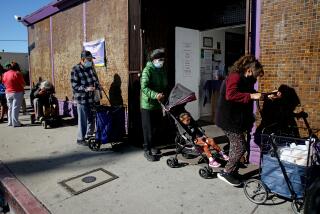Ranks of Homeless Children on the Rise, Study Finds
- Share via
Every night, more than 1 million children in America face the dark with no place to call home.
They are hungry, anxious and often exposed to violence. They shuttle between shelters and fall behind in school. They are the vulnerable new face of the American homeless.
Experts say that there are more homeless children in America than at any time since the Great Depression. About 40% of America’s homeless are now women and their children--the fastest-growing homeless group.
These are the conclusions of an unprecedented study unveiled Wednesday that shows that this transient childhood on the mean streets of America is shortchanging children, robbing them of education, health and emotional stability.
The study’s report, presented Wednesday at a women’s conference in Los Angeles, documents how children are being scarred by the kind of trauma that ravages survivors of war and natural disasters--condemning some to mental illness. It warns that their harsh plight will squander countless potentially productive citizens unless action is taken to arrest the disturbing trend.
“The face of homelessness in this country has changed dramatically,” said Ellen Bassuk, an associate professor of psychiatry at Harvard Medical School and president of the Better Homes Fund, which produced the report, “Homeless Children: America’s New Outcasts.”
The fund is a national nonprofit group that uses research and fieldwork to recommend policies and programs to benefit the homeless. It derived its figures for the study from national homeless organizations, the U.S. Department of Education and the census.
“Young children are without homes in the largest numbers since the Great Depression,” said Bassuk, the lead investigator in the study. “We must act now to halt this epidemic before we lose another generation.”
Deborah Weinstein of the Children’s Defense Fund, a Washington advocacy group, called the findings “groundbreaking--and heartbreaking too.”
“This is lapel-grabbing news,” Weinstein said. “We are very concerned about what happens to these children. We consider this to be a major contribution.”
Weinstein said one of the most ominous findings of the two-year study was that an alarming number of the mothers studied--92%--had been sexually or violently abused. Forty-five percent had been sexually molested as children and 66% had been violently abused by an adult before age 18. Half had been homeless as children. Two-thirds of the women had been abused by intimate male partners.
Forty-five percent have experienced major depression and more than a third had post-traumatic stress disorder--a syndrome, first observed among Vietnam War veterans, that subjects its victims to recurring anxiety and depression.
Lifelong Damage of Violence, Stress
Weinstein said such documentation is especially disturbing because it shows the lifelong collateral damage of violence and stress. It suggests that homeless children--who often are exposed to violent trauma at young ages, when their developing psyches are more fragile--are being set up for the stress-related emotional problems that place them at risk of becoming homeless adults, she said.
She said policymakers must be made aware that getting women off welfare often means far more than just finding them a job.
“We need to help these people,” she said. “We can’t push them off assistance without providing the support they need.”
In the early 1980s, the number of homeless children was negligible, Bassuk said in a presentation of the study at the Second National Conference on Women.
Since then, divorce and the growth of female-headed families--about a third of which live in poverty--have conspired to turn growing numbers of women with children into the streets, even as the nation enjoys one of the longest sustained economic booms in history.
“Despite our affluence, we have quietly allowed a Third World nation to arise in our country,” said Bassuk, who has studied the homeless for nearly a decade. “We are calling for immediate action to correct this desperate situation.”
Like other homeless people, some homeless mothers suffer from mental illness. Some have stress disorders, suffer severe economic setbacks or are fleeing abusive spouses. Some of the women have learned to deaden their pain with substance abuse.
While on the streets, homeless children endure such unsettling experiences that a full third have mental disorders by the time they are 8 years old, Bassuk said.
The study said that homeless children’s rate of sexual abuse--8%--is three times as high as other children, and they endure twice the physical abuse. A quarter of them have witnessed violence in the family and 15% have watched their father hit their mother.
Perhaps unsurprisingly, homeless children are twice as likely to repeat a grade or be suspended from school. They have four times the rate of delayed development. Many attend three or more different schools in a single year.
Short-Term Solutions
To tackle the problem, the report suggested several short-term solutions:
* Address the health needs of homeless children. Many do not get proper immunizations, suffer from asthma and need mental health treatment.
* Ensure adequate food and schooling.
* Provide job training and placement for parents.
* Create programs to treat and prevent violence.
The report called for more affordable housing and for more attention on lower-income Americans, expanding grants for their higher education and assisting them in building assets.
Officials said one program that attempts to provide this comprehensive approach, Shelter Plus Care in Santa Monica, has had a very high success rate with homeless mothers, who represent a third of their 150 participants.
The HUD-financed program provides five years of housing and all-around support for homeless mothers to guide them into permanent housing and lives. To date, all the women with children have retained their housing, according to Deborah Maddis, an analyst for the Santa Monica Housing Authority.
More to Read
Sign up for Essential California
The most important California stories and recommendations in your inbox every morning.
You may occasionally receive promotional content from the Los Angeles Times.













